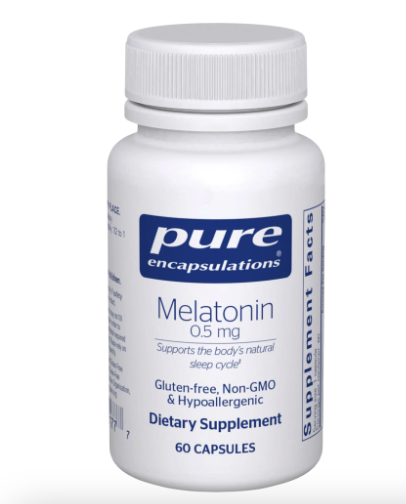You Had a Bad Night’s Sleep. Here’s How Not to Ruin Your Day
Aug 29, 2025
We’ve all been there. You wake up at 3am, only to toss and turn, and the clock keeps ticking. Before you know it, morning arrives and you’ve only had a handful of restless hours. The good news? One bad night doesn’t have to derail your entire day—or your health. Here’s how to recover and still have a good day - and to set yourself up for a better night’s rest, tonight.
1. Decide you’re going to have a good day, in spite of not sleeping.
Literally what makes or breaks my day: my mindset. If I think the lack of a good night’s sleep is going to crater me and my self talk is, “oh God, I’m so tired!,” it will. If I think I’ll manage to pull off a good day in spite the lack of sleep, I - more often than not - will have a good day. It’s so important to condition yourself mentally that today's going to be a good day. Try to take your attention off your tiredness. If you mentally keep telling yourself, “I’m exhausted,” your body listens and you automatically feel the fatigue more. If you tell yourself, “Whatever, today’s going to be a good day,” it'll happen. So mentally shift your energy, and then follow these steps:

2. If It’s Still Early Morning, Try NSDR Instead of Forcing Sleep
If you wake up too early and can’t drift back off, don’t panic-scroll your phone. Instead, listen to a Non-Sleep Deep Rest (NSDR) track. These guided practices help shift your brainwaves into a more restorative state, mimicking some of the benefits of deep sleep. Even if you don’t fall back asleep, your body will still harvest rest and repair. You can also try meditation, which not only shifts brainwaves from beta to alpha, but triggers relaxation and gratitude - a wonderful start to your day, even in the blur of fatigue.
3. Seek Out Morning Sunlight
Expose your eyes (without sunglasses!) to 15 minutes of natural light, as soon as the sun is up. Sunlight is a powerful signal to your circadian clock, helping reset your rhythm for tonight and boosting serotonin and mood during the day.

It also triggers serotonin, the chemical responsible for you feeling alert. Importantly, serotonin production triggers melatonin production, about 12 hours later. This is one of my non-negotiable habits, every morning!
4. Get Moving—Even If You’re Tired
I get it, you’re exhausted - and I’m telling you to work out?! But hear me out: even though it’s counterintuitive, exercise will make you feel better, not worse. A brisk walk, yoga, or even a moderate strength session can regulate cortisol, increase blood flow, and help reset your circadian rhythm. I swear, you will almost always feel better. The key is be kind to yourself and not overdo it. Move your body to energize it, not exhaust it.
5. Don’t Over-Caffeinate—Hydrate Instead
The temptation is to mainline coffee, but too much caffeine can spike cortisol, lead to jitters, and actually worsen fatigue later in the day. Hydrate first (I start every morning with hot lemon water with 1/2 tsp salt, for electrolytes), then cap it at one cup, and don’t drink caffeine after 9am because caffeine has a half-life of 6 hours, meaning it’s still in your system until 8 or 9pm). Switch to hydrating generously - either alkaline water or an electrolyte-rich drink to stay hydrated. Lots and lots of water. Your body and brain function far better when well-hydrated.

6. Choose Nourishing Foods (Not Junk)
When you’re tired, your brain craves quick comfort: sugar, refined carbs, salty takeout. But these foods cause blood sugar swings and can make fatigue worse; plus, they’ll likely trigger inflammation and bloating, leading you to spiral. It’s hard, but fight the urge and go for healthy food options which will balance blood sugar levels and avoid cortisol spikes / crashes:
- 40g lean protein per meal (chicken, fish, eggs, beef, lentils, dairy if you can tolerate).
- Leafy greens + fiber to stabilize blood sugar and feed your gut.
- Healthy fats (avocado, olive oil, nuts) to keep energy steady.
- Fruit for dessert: berries, citrus fruit and apples bring important nutrients and fiber.
Avoid processed foods and added sugars - these are cortisol triggers! Think of every meal as a way to signal safety and stability to your body—not another stressor.
7. Walk It Off When Fatigue Hits
When the midday slump hits, resist the urge to just push through. Get up, step away from your desk, and take a 10-minute walk outside. Movement regulates blood sugar, brings down cortisol, and gives your brain a mental reset.

8. Mindset Check-in: You’re Doing Your Best
Throughout your day, check in with yourself and adjust expectations and self-talk. How are you doing? You may only have 50% of your usual energy, so give what you can. That will be enough. Can the family do leftovers instead of you cooking dinner tonight? Can household chores shift to later in the week? Remember that your track record for surviving challenging times is 100%, so you will get through this, but some things will need to give. And that’s okay and everyone’s going to be just fine.

9. Take a Walk After Dinner
An after-dinner walk is one of the simplest, most powerful ways to set yourself up for a better night’s rest. Why?
- Walking after eating helps your muscles soak up blood glucose, keeping your blood sugar steady instead of spiking and crashing.
- It improves insulin sensitivity, which becomes especially important in perimenopause and beyond.
- It supports digestion and calms the nervous system—helpful for reducing bloating, restlessness, or nighttime cortisol surges.
Aim for a 10–20 minute brisk walk within an hour after your last meal - I walk my dog every night for 20 minutes exactly for this reason. But this isn't meant to be a power workout. You want to make sure your walk relaxes you rather than revving you up.
10. Protein Before Bed: Casein to the Rescue
Remember when you were little, you’d get a glass of milk before bed, to help fall asleep? There’s something to that, for us mid-life ladies. One of the sneaky reasons women wake up at 3 a.m. is an overnight blood sugar dip. When glucose drops too low, your body pumps out cortisol to stabilize you—and boom, you’re awake at 3am. The solution? A small serving of protein before bed, especially casein protein, which digests slowly and fuels your body through the night.

Casein-Rich Options (Beyond Protein Powder)
- Greek yogurt → naturally high in casein and pairs well with berries or a drizzle of nut butter.
- Cottage cheese → another dairy option loaded with casein; try with cinnamon and sliced apple.
- Milk or kefir → especially whole or 2% milk, which has a mix of whey and casein for sustained release.
- Cheese (like mozzarella or cheddar) → a small serving gives you casein plus healthy fats.
Plant-Based Alternatives
If dairy isn’t an option, you can still mimic the effect with slow-digesting proteins:
- Soy yogurt or tofu-based snacks (soy contains all essential amino acids and digests more slowly than many plant proteins).
- Lentil or chickpea-based snacks (protein + fiber slows digestion and helps with overnight stability).
The goal isn’t a full meal—it’s a light, protein-rich snack that gives your body steady amino acids and helps prevent cortisol spikes overnight.
11. Consider Sleep Supplements
When one rough night turns into a pattern, gentle supplementation can help bring your body back into balance. Some of my favorites for midlife women include:
- Magnesium glycinate or threonate (200–400 mg) → calms the nervous system and muscles, supports deep sleep.
- L-theanine (100–200 mg) → eases mental chatter without next-day grogginess.
- Ashwagandha (KSM-66® or Sensoril®, 120–300 mg in the evening) → an adaptogen that can reduce perceived stress and nighttime cortisol, supporting deeper, calmer sleep.
Always check with your provider before starting something new, but when used thoughtfully, these can be wonderful tools for deeper rest. I use all of these at night and they help me drift off, peacefully and easily.
12. Microdose Melatonin
Many women take 3–5 mg of melatonin nightly, but research shows that this is often more than your body needs and can sometimes work against good sleep.
Melatonin is a hormone your brain produces naturally in response to darkness. Its job isn’t to “knock you out” but to signal your body that it’s nighttime and help shift your circadian rhythm. When it comes to melatonin, less is more (effective). Let’s unpack why.
The physiological dose your brain makes naturally is around 0.1–0.5 mg. Most studies suggest that microdosing 0.3–1 mg is enough to mimic natural levels and nudge your circadian rhythm.
Higher doses (like 3–5 mg) may raise melatonin well above natural nighttime levels, which can lead to grogginess or “hangover” effect the next day. It might even desensitize your melatonin receptors over time, making the hormone less effective. If you’re jet lagged or have shift work, higher doses (2-5mg) can be used to ‘reset’ the clock. But for midlife sleep support, most experts recommend starting low and titrating only if needed.
How to micro dose melatonin:
- Start with 0.3–0.5 mg about 30–60 min before bed, or: if you have no difficulty falling asleep, but wake up at 2am, take a microdose then.
- See if your sleep onset improves without morning grogginess.
- If you’ve been on a higher dose of melatonin, you can gradually step down over a week (e.g., 3 mg → 1.5 mg → 0.5 mg).
- Combine with circadian anchors: morning sunlight, evening darkness, no caffeine after noon.
This has been me. I find that with a higher dose of melatonin (3-5mg), I wake up after a few hours and am quite groggy. But with a microdose, I seem to fall back asleep easily in the middle of the night and wake up refreshed. Bottom line: For most women, especially in perimenopause and menopause, less melatonin is more effective. Microdosing helps signal sleep without overwhelming your system.
13. Prioritize Recovery Tonight
One rough night doesn’t define your week. Protect your next night’s sleep by:
- Avoiding screens after 8pm (blue light blocks melatonin).
- Skipping alcohol (it fragments sleep cycles).
- Aiming for an early bedtime (9pm is not too early on a recovery day).
- Using wind-down rituals: stretching, journaling, or magnesium tea
If That Doesn't Help.. My Extra Hacks for Rough Days
If it’s a couple of days in a row, you might need some extra hacks, to encourage adrenaline in the morning so it drops later in the day. Try:
- Cold rinse or shower: Stimulates alertness and lowers inflammation.
- Breathwork (4-7-8 or box breathing): Helps regulate stress response when you feel wired or anxious.
- Short nap (10–20 mins): If you truly can’t function, a quick nap can boost alertness without leaving you groggy.
In summary...
One bad night of sleep won’t undo your progress. By leaning on NSDR, movement, hydration, smart nutrition, sunlight, and recovery habits, you can salvage your day and protect your long-term health. We've got to get sleep in order to thrive. Share this with a friend if it resonated with you, and let me know any sleep hacks you swear by for my next post on sleep.
Let's age well naturally, lovelies-
x
Juliana
PS - if you enjoyed this blog post, sign up for our monthly newsletter! We drop aging well strategies on nutrition, exercise, sleep, HRT, clean beauty, facial exercise & more.







